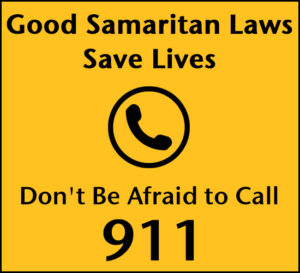Pennsylvania Drug Overdose Immunity Law
Pennsylvania’s version of the “Good Samaritan” or drug overdose immunity law is intended to encourage people to call for medical assistance for people that are suffering from drug overdoses without a fear of the caller being prosecuted or the person needing medical assistance being prosecuted. The law, found at 35 P.S. 780-113.7, generally prohibits the government from  prosecuting the caller or the person seeking medical assistance for new, non-felony criminal offenses, and it prevents such people for being prosecuted for probation or parole violations based upon the drug use. However, the law does NOT prohibit the government from prosecuting felony offenses, like drug delivery or distribution, and the police are allowed to file charges related to drug-related deaths.
prosecuting the caller or the person seeking medical assistance for new, non-felony criminal offenses, and it prevents such people for being prosecuted for probation or parole violations based upon the drug use. However, the law does NOT prohibit the government from prosecuting felony offenses, like drug delivery or distribution, and the police are allowed to file charges related to drug-related deaths.
Requirements for Overdose Immunity
In order to be immune from prosecution, the law imposes requirements that must be followed. Generally speaking, immunity applies if:
- the police only became aware of the offense because someone transported the overdosing person to a law enforcement agency, campus security office, or healthcare facility; OR
- a person reported an overdose incident to law enforcement, 911, campus security, or emergency services personnel based upon a reasonable belief that someone needed immediate medical attention to prevent death or serious bodily injury due to a drug overdose; the person provided his name and location to emergency responders; the person remained with the overdosing person until emergency personnel arrived; and the person cooperated with emergency responders.
How can the district attorney prosecute a drug overdose case?
In some cases, it is clear that the immunity law would apply and prevent a prosecutor from pursuing charges. However, in other cases, the application of overdose immunity is not clear. Some district attorneys in Pennsylvania require strict adherence to the requirements and will prosecute misdemeanor possession charges if the requirements for immunity are not precisely followed. For example, the former Centre County District Attorney successfully defeated overdose immunity because the caller for assistance was not in the presence of the person suffering an overdose. Other prosecutors may seek to avoid application of the immunity law by arguing that the caller did not have a reasonable belief that someone needed immediate medical attention to prevent death or serious bodily injury. The person needing medical attention must be suffering from a “drug overdose event, which “includes, but is not limited to “severe physical illness, coma, mania, hysteria or death, which is the result of consumption or use of one or more controlled substances causing an adverse reaction.” If the police or a prosecutor does not believe that immunity applies to a case, then the prosecutor will pursue a conviction. In such cases, it is critical that an experience defense attorney is retained to file a motion and seek a dismissal of the charges by a judge. Attorney Jason S. Dunkle has successfully argued for a dismissal of charges based upon immunity laws in Pennsylvania.
